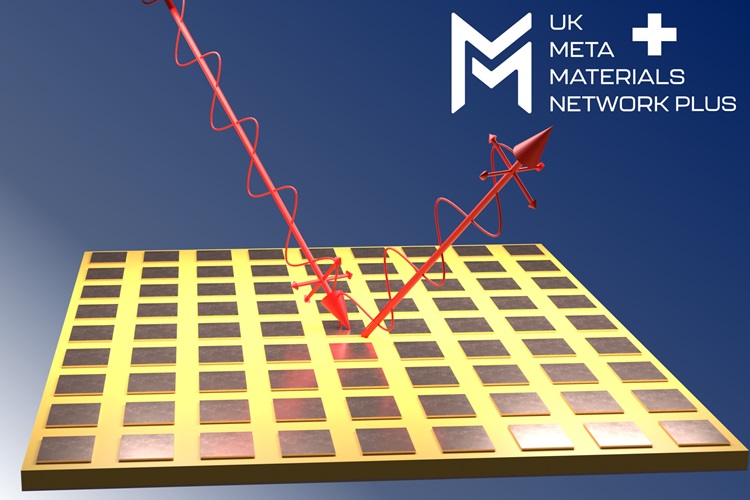Metamaterials NetworkPlus launched after securing £2.5 million funding

The UK Science and tech research community will benefit from an additional £2.5m funding from the Engineering and Physical Sciences Research Council (EPSRC), part of UK Research and Innovation investment into metamaterials research via a new, collaborative NetworkPlus.
The UK Metamaterials NetworkPlus (UKMMN+) is co-led by Professor Alastair Hibbins, University of Exeter, and Dr Claire Dancer, University of Warwick, alongside a team of co-project leads from across the UK, including Professor Andrea Di Falco from the School of Physics and Astronomy at the University of St Andrews.
The NetworkPlus will ensure the UK is a global metamaterials leader, spearheading the future of communications, defence, sustainability, healthcare, space, and aviation.
The UKMMN+ aims to grow a national metamaterials ecosystem and facilitate the development of innovative metamaterials through pump-prime funding. It will be formally launched at the Metamaterials UK Conference and Forum (Sunday 19 to Thursday 23 May 2024).
Metamaterials have phenomenal potential: these artificial 3D structures are comprised of at least two different materials. This combination and the structure then gives a metamaterial a property beyond those of the materials used to make it. They will transform our economy in a digital age, helping to address society’s challenges. They will contribute to achieving sustainability, advancing healthcare and communications, providing defence and security capabilities, enhancing computation techniques, and benefiting the space and aviation industries.
The NetworkPlus will drive an increase to UK research in this vital technology area. It will bring together experts from academia, industry and government to accelerate progress towards the UK’s technological priorities. It has an essential role to play in maintaining and growing UK leadership in discovery science on the global stage.
The NetworkPlus aims to develop the UK’s potential as a thriving, innovation driven, research and industry base. To do this the NetworkPlus aims to:
- bring together the current and next generation of academic, start-up and industry leaders in the UK, and open the field beyond its traditional boundaries
- provide a reliable nexus for information, experts and cutting-edge science and technology
- support pilot and explorative projects to initiate research areas which are new to the UK or strategically important
- support the development of close links between government, academics and industry, providing a strong advocacy for metamaterials activities
- work to create a strong regulatory framework and shape international norms and standards
- showcase metamaterials potential, growing its potential in the UK.
The Award will run for four years until September 2028 and will help develop game-changing breakthroughs. It will build the UK’s skills pipeline, driving through generation-after-next technology and high-value products.
Professor Hibbins, project lead of the new NetworkPlus and Director of the University of Exeter’s Centre for Metamaterial Research and Innovation, said: “The scope of metamaterials is huge; metamaterials as a concept provides the opportunities to control information and energy through careful structuring of conventional materials. But of course, ‘information’ and ‘energy’ are very general terms and cover an enormous range of devices; what we really mean is heat, fluid-flow, light, vibration, sound, radar, relevant to technologies such as communication, computing, electronics, health, sustainability and defence.
“This breadth in science and application has meant that the excellence in our academic community has been incredibly diverse but not joined-up. For the last few years, Dr Claire Dancer from the Warwick Manufacturing Group (University of Warwick) and I have co-led the Network, and with the funding and support from EPSRC and Dstl, we’ve been working incredibly hard to forge a new UK ecosystem for metamaterials where we work together to support each other, and drive work into areas that require multidisciplinary approaches to solve global challenges.”
Dr Dancer said: “We’re incredibly excited by this additional funding from EPSRC. Not only are we now able to continue supporting our community, but we are now going to be able to offer pump-prime funding for a number of priority projects that are strategically important to us.”
Co-project leads for the award are based at the University of Exeter, the University of Warwick, the University of Cambridge, the University of Sheffield, Manchester Metropolitan University and the University of St Andrews. Members of the leadership team are also based at Sheffield Hallam, Queen Mary University, the Defence Science and Technology Laboratory (Dstl), MBDA Systems, Imperial College London, the University of Nottingham, M Ventures, QinetiQ, Durham University, and the National Physics Laboratory (NPL).
Issued by the University of St Andrews Communications Office.